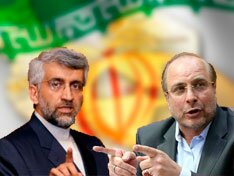
There is a week before the Presidential election in Iran. Western and Iranian analysts are more and more actively discussing a possible Presidential candidacy of Iran. At present, almost all of them agree about the two leaders of the Presidential race:
- Mayor of Tehran, Mohammad Bagher Qalibaf;
- Secretary of the Supreme National Security Council (SNSC) and the main "nuclear negotiator" Saeed Jalili.
According to recent opinion polls Qalibaf is leading with 24 percent of his supporters. Thus, in case of opposition of Qalibaf against Jalili, for Qalibaf are ready to vote 56% of the respondents, for Jalili - only 27.5%.
In the pair of Qalibaf – Velayati, the Mayor also wins with a score of 47% versus 28%. In rivalry Qalibaf against Hoddad Adel, the result is 55% versus 18% in favor of Qalibaf again.
Moreover, 120 (out of 290) Deputies of Majlis have already made a joint statement in support of Qalibaf. But ...
In Iran, it is very, very difficult to predict the victory of a candidate in the election, as almost everything depends not on skill of candidates and their supporters to lead propaganda and to win votes, but on the word of the Supreme Leader Ayatollah Ali Khamenei.
On the eve of nomination of candidates for the Presidential election, the current President of the country Mahmoud Ahmadinejad asked the Supreme Leader to refrain from making public statements in favor of any candidate, as it immediately puts other candidates in a losing position. But then the leader is meant to do what he considers necessary.
Yes, Qalibaf is a worthy candidate for the Presidency. His motto is, "I do not believe in populism and fooling people - my approach has always been a logical, scientific and systematic one." His political views are rather eclectic. They combine Islamic conservatism with the need for reforms, and perhaps not only economic ones. According to Qalibaf, the Iranian economy is in need of deep reforming. He also is sure that all the problems faced by Iran in the international arena, also show an unreasonable foreign policy of the current President. This concerns the Iranian nuclear issue, and related actions that had led to international sanctions.
He has declared that if he becomes President, he will move forward the talks on the nuclear issue. In this regard, he also said that if necessary, Iran may always enter into negotiations with the United States, as "negotiations with the United States have never been a red line for IRI”.
That's what scares or rather alarms the leader. After all, Qalibaf is not just ready to start negotiations with Washington and seek a compromise. There are a couple of other presidential candidates who are ready to start negotiations with the West.
It was this that prompted Ali Khamenei on the 4th of June, in his speech on the occasion of the 24th anniversary of the death of the founder of the Islamic Republic of Iran Ayatollah Khomeini, to state that Iran has a number of problems and the President should be the person who will be able to solve these problems. "Candidates have to make promises which they will be able to fulfill," - he said, adding that "the powers of the President are limited only by Law, which has to guide the actions of the President, but not to tie up his hands."
But then the Supreme Leader said that he could put an end to all Qalibaf and his supporters’ efforts to win the election. "Some candidates have declared in their election programs, that it is necessary to make concessions to our enemies" - said Khamenei. "You cannot put personal interests above the interests of the Iranian people," - he stressed, adding that "the candidates must promise to put the interests of the people of Iran above all." He then called on the Presidential candidates not to make concessions to the international community, defending the state's nuclear program. A candidate who is willing to go all the way, up to the unpredictable, is nobody else but Saeed Jalili.
In this is the unpredictability of Iran. Despite the ratings of the candidates, ordinary Iranians will vote for the one to whom will point the Supreme Leader. Like it was in 2005, when Mahmoud Ahmadinejad became the President and threw the country into a new round of strained relations with the West.

